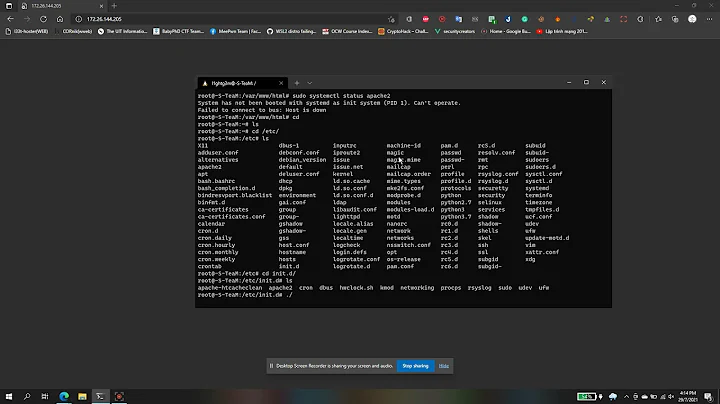init service failing to enable once a systemd service file is generated
I've now found that the issue was that the service file automatically generated by systemd-sysv-generator lacks an install section with a WantedBy option. I added the following to my generated file at /etc/systemd/system/programexample.service which allowed me to properly enable the service:
[Install]
WantedBy = multi-user.target
After that I ran
systemctl daemon-reload
to ensure my service file was read by systemd.
Now I received a proper notification that my service was actually symlinked somewhere to be "enabled":
[root@centos7-box ~]# systemctl enable programexample.service
Created symlink from /etc/systemd/system/multi-user.target.wants/programexample.service to /etc/systemd/system/programexample.service.
This link helped me better understand the service file.
I am not a fan of the way that systemd-sysv-generator does not include an install section with a WantedBy option by default. If systemd can dynamically read the LSB headers and properly start services at boot, why doesn't it generate the service file accordingly? I suppose some systemd growing pains are to be expected.
Update July 7 2020:
Working with Debian Buster and trying to enable a SysVInit legacy service, I was presented with this wonderful message, which I believe would have saved me some time when I dealt with this issue in 2017:
Synchronizing state of programexample.service with SysV
service script with /lib/systemd/systemd-sysv-install.
Executing: /lib/systemd/systemd-sysv-install enable
programexample
The unit files have no installation config (WantedBy=,
RequiredBy=, Also=, Alias= settings in the [Install] section,
and DefaultInstance= for template units). This means they are
not meant to be enabled using systemctl.
Possible reasons for having this kind of units are:
• A unit may be statically enabled by being symlinked from
another unit's .wants/ or .requires/ directory.
• A unit's purpose may be to act as a helper for some other
unit which has a requirement dependency on it.
• A unit may be started when needed via activation (socket,
path, timer, D-Bus, udev, scripted systemctl call, ...).
• In case of template units, the unit is meant to be enabled
with some instance name specified.
Related videos on Youtube
Toby
Updated on September 18, 2022Comments
-
Toby over 1 year
I've been troubleshooting an issue with a sysVinit service not coming online properly at boot within a systemd environment. What I've found is that when no service file or overrides are present in /etc/systemd/system/ for the said service, it autostarts properly. In this case, as I understand it, systemd should be dynamically loading the startup script via reading "legacy" sysvinit scripts present on the system, although I'm not 100% clear on that.
What I'm confused about is that as soon as I pass the edit --full option to systemctl for said service, a flat file is generated at /etc/systemd/system/ and said service now fails to autostart at boot. Using the edit option and trying to add any overrides also seems to cause the service to fail to boot.
Examples, if needed, provided below...
Example of the system when it works:
The service, in this example called "ProgramExample" has an init script placed in /etc/init.d/programexample and also /etc/rc.d/init.d/programexample:
[root@centos7-box ~]# ls -l /etc/rc.d/init.d/programexample -rwxr-xr-x. 1 root root 2264 Mar 29 14:11 /etc/rc.d/init.d/programexampleNo service file present at /etc/systemd/system/:
[root@centos7-box ~]# ls -lh /etc/systemd/system/programexample.service ls: cannot access /etc/systemd/system/programexample.service: No such file or directorySystemctl status output in this configuration:
[root@centos7-box ~]# systemctl status programexample.service ● programexample.service - LSB: Start Program Example at boot time Loaded: loaded (/etc/rc.d/init.d/programexample; bad; vendor preset: disabled) Active: active (exited) since Wed 2017-03-29 15:53:06 CDT; 14min ago Docs: man:systemd-sysv-generator(8) Process: 1297 ExecStart=/etc/rc.d/init.d/programexample start (code=exited, status=0/SUCCESS) Mar 29 15:53:05 centos7-box systemd[1]: Starting LSB: Start ProgramExample at boot time... Mar 29 15:53:05 centos7-box su[1307]: (to programexample) root on none Mar 29 15:53:06 centos7-box programexample[1297]: ProgramExample (user programexample): instance name set to centos7-box Mar 29 15:53:06 centos7-box programexample[1297]: instance public base uri set to https://192.168.0.148.programexample.net/programexample/ Mar 29 15:53:06 centos7-box programexample[1297]: instance timezone set to US/Central Mar 29 15:53:06 centos7-box programexample[1297]: starting java services Mar 29 15:53:06 centos7-box programexample[1297]: ProgEx server started. Mar 29 15:53:06 centos7-box systemd[1]: Started LSB: Start ProgramExample at boot time.With the above configuration, without any files created/placed in /etc/systemd/system/, the ProgramExample service autostarts properly.
Once systemctl edit --full (or just edit) is used:
Once any edits are passed to systemctl, I have observed the following:
- A flat file or an override directory will be placed in /etc/systemd/system/
- Said service, in this case ProgramExample, fails to start at boot.
- I will be unable to "enable" said service using systemctl
Systemctl status output in this configuration (post edit):
[root@centos7-box ~]# systemctl status programexample.service ● programexample.service - LSB: Start ProgramExample at boot time Loaded: loaded (/etc/rc.d/init.d/programexample; static; vendor preset: disabled) Active: inactive (dead) Docs: man:systemd-sysv-generator(8)This is the service file that is being generated and placed in /etc/systemd/system/ when using the -edit --full option:
# Automatically generated by systemd-sysv-generator [Unit] Documentation=man:systemd-sysv-generator(8) SourcePath=/etc/rc.d/init.d/programexample Description=LSB: Start ProgramExample at boot time Before=runlevel2.target Before=runlevel3.target Before=runlevel4.target Before=runlevel5.target Before=shutdown.target Before=adsm.service After=all.target After=network-online.target After=postgresql-9.4.service Conflicts=shutdown.target [Service] Type=forking Restart=no TimeoutSec=5min IgnoreSIGPIPE=no KillMode=process GuessMainPID=no RemainAfterExit=yes ExecStart=/etc/rc.d/init.d/programexample start ExecStop=/etc/rc.d/init.d/programexample stop ExecReload=/etc/rc.d/init.d/programexample reloadWhat is happening here? Am I correct that without the flat service file and/or service override directory in /etc/systemd/system/ that systemd is dynamically reading this information from said service's init script? I've tried numerous iterations of editing the service file at /etc/systemd/system/ and leaving the default file in place and cannot get autostarting to work or the service to go into an "enabled" state.
I believe it would be preferable to have a systemd .service file for systemd configurations instead of relying on systemd to read from init script LSB headers for compatibility and concurrency reasons but the default file systemd is creating is failing to start or enable along with numerous other more simple iterations of the .service file I've attempted.
-
Philip Rego over 4 yearsSystemV doesnt make any service files at /etc/systemd/system/
-
Toby over 4 years@PhilipRego You are correct. In the context above, systemd-sysv-generator does this.
-
Philip Rego over 4 yearsI'm using SYSTEMD-SYSV-GENERATOR (8) and it didn't create a service file there.
-
Toby over 4 years@PhilipRego This question and answer were written and answered using a vanilla CentOS 7 build (and re-tested again just now on CentOS 7 and Debian 10). You may need to consult documentation for your specific system if you are using a different OS. Assuming you are on CentOS 7 or Debian 9+, are you saving the generated .system file after passing the "systemctl edit --full"? If you are having a hard time locating your service files, you may want to try using a tool such as mlocate and locating your .service file that way.
-
Philip Rego over 4 yearsThis is the folder my script was in /etc/rc.d/init.d/





